Beulah Reissues - Summer and Autumn 2021 Update
By Brian Wilson
I’ve fallen behind in updating readers with Beulah releases since the early
Spring. Two of a group of colleagues who are working from downloads and
whose work I am co-ordinating, editing and converting to html reviewed the
three Alfred Brendel tributes –
review
–
review
– Recommended:
review
– but I’ve been too busy co-ordinating their reviews to catch up since.
As always, and in common with the advice on the Beulah website
(eavb.co.uk), I recommend streaming or downloading these releases from
Qobuz in lossless sound, as opposed to the mp3 offered at the same price by
other providers. These are careful transfers which make the most of the
material, whereas I suspect that some others just stick an LP or 78s on the
turntable and give us what comes out the other end. Beulah’s results are
comparable with the fine transfers which Naxos Historical offer.
Index:
BACH
Keyboard Concerto No.4 – Thurston Dart – see Baroque Concertos
French Suites 5 and 6 – see Essence of Thurston Dart
Matthäus Passion: Erbarme dich
– see Essence of Thurston Dart
The Essence of JS Bach
BIZET
The Fair Maid of Perth (complete)
BRAHMS
Piano Concerto 1; Symphony 3 – Curzon, Solti
COATES
London Bridge, London Suite, London again – see In London Town
DUKAS
L’Apprenti Sorcier
– see Essence of George Solti
GOUNOD
Faust
Ballet music – see Classic 78s
ELGAR
Cockaigne Overture – see In London Town
HANDEL
Organ Concerto, Op.7/1 – see Baroque Concertos
HOPKINS
Talking about Music
IVES
Symphony 3, Three Places in New England – see American Compositions 3
LEO
Cello Concerto – see Baroque Concertos
MENOTTI
Amahl and the Night Visitors, The Telephone
MILLER, Glen
Starlit Hour
MOZART
Epistle Sonata K274 – see Essence of Thurston Dart
Piano Concerto 12, Symphonies 34 and 36 – see Beecham’s LPO Years 2
PUCCINI
La Bohème
Act 4 – see Beecham’s LPO Years 3
PURCELL
Keyboard Suites – Thurston Dart
SCHUBERT
Symphony No.5 – Solti (with Tchaikovsky)
 Piano Trio No.1; ‘Trout’ Quintet – Curzon, etc.
Piano Trio No.1; ‘Trout’ Quintet – Curzon, etc.
 Piano Sonatas 20 and 21 – Schnabel
Piano Sonatas 20 and 21 – Schnabel
SIBELIUS
The Essence of Jean Sibelius: Symphony No.7 (Collins), etc.
TCHAIKOVSKY
Symphony No.5 – Solti (with Schubert)
VAUGHAN WILLIAMS
The Wasps Overture – see Classic 78s
VERDI
La Forza del Destino
Overture – see Essence of George Solti
VIVALDI
Bassoon Concerto RV484 – see Baroque Concertos
WAGNER
Rheingold
Scene 3 – see Essence of George Solti
WALLER, Fats
Ain’t Misbehavin
American Compositions 3
Baroque Concertos – Barbirolli, Dart, etc.
Beecham’s LPO Years – 1: French Music
2: Mozart
3: Opera and Oratorio
Cinema Organ Favourites – Reginald Dixon, etc.
Essence of George Solti, The
 Essence of Thurston Dart, The
Essence of Thurston Dart, The
Jazz Britannica Volumes 1-6
***
My first choice among recent Beulah reissues has to be:
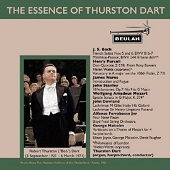

The Essence of Thurston Dart
Johann Sebastian BACH (1685-1750)
French Suites Nos. 5 and 6, BWV816-7 [10:05 + 9:19]
Matthäus-Passion, BWV244: ‘Erbarme dich’ [7:14]
Henry PURCELL
Don Quixote, Z578: ‘From rosy bowers’ [7:02]
Voluntary in A on the 100th Psalm, Z721 [3:12]
James NARES
Introduction and Fugue [4:32]
John STANLEY
10 Voluntaries, Op.7: No.9 in G [3:35]
Wolfgang Amadeus MOZART
Epistle Sonata in G, K274 [5:14]
John DOWLAND
Lachrimæ: M Giles Hoby his Galliard [6:13]
Lachrimæ: Sir Henry Umptons Funeral [5:59]
Alfonso FERRABOSCO Junior
Four Note Pavan [5:31]
George MALCOLM
Variations on a Theme of Mozart for Four Harpsichords
[8:49]
Helen Watts (soprano)
Eileen Joyce, George Malcolm, Denis Vaughan
(harpsichord)
Philomusica of London
Boyd Neel String Orchestra
Thurston Dart (organ, harpsichord, director)
BEULAH 3PD69
[76:48]
I have already set down my appreciation of the work of Thurston Dart, a
rare combination of academic and performer, not least in my review of the
Eloquence reissue of his recording of Handel’s Water Music with the
Philomusica of London –
review.
That’s well worth hearing, not just for its historical significance as
the first complete recording, in 1960, of the whole Water Music, not just
the suites which Sir Hamilton Harty had cobbled together, but also because
Dart was beginning to produce from a modern-instrument orchestra, used to
playing with oodles of vibrato, something much closer to the
period-instrument sound to which we are now more accustomed. All that
without the exaggerated phrasing and breakneck tempo which some authentic
performers are prone to give us. And without the rather stiff idea of
authenticity that Boyd Neel had produced on some of his recordings.
Beulah, too, have done their part in perpetuating Dart’s memory; in fact,
there’s very little to choose in quality between the Eloquence Water Music,
made from the original tapes, and the Beulah reissue, which couples more
Handel from Dart in the form of his 1956 recordings of the harpsichord
suites. I originally praised the Beulah transfers of the Water Music in
December 2010;
the addition of the keyboard music makes it more desirable, though, at 94
minutes, my preferred download in lossless sound from
Qobuz
has pushed the price up from their usual £7.99 to £11.99 (2PD69 –
Summer 2018/1).
The Essence of Thurston Dart
is designed to present him in a variety of roles, organist, harpsichordist
and director, both of his own Philomusica and the Boyd Neel Chamber Orchestra, another precursor of first
the Academy of St Martin and the period-instrument movement. While
period-instrument performance remains controversial, these Dart recordings
from an earlier stage in the process offer a compromise that never seems like one, well worth hearing in their
own right. As a sidelight on the historical performance debate, my
colleague
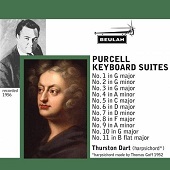 Chris Salocks wrote a well-argued critique from his point of view
of the recent Harmonia Mundi Beethoven Triple Concerto –
review
– which has just been revealed as one of the close runners-up in the 2021
Gramophone awards. De gustibus …
Chris Salocks wrote a well-argued critique from his point of view
of the recent Harmonia Mundi Beethoven Triple Concerto –
review
– which has just been revealed as one of the close runners-up in the 2021
Gramophone awards. De gustibus …
There’s more Thurston Dart on two other Beulah reissues. 1PD69, originally released in 2011, gives us his recording
of Henry PURCELL Keyboard Suites on a Goff harpsichord. As
the editor of the Purcell Society edition of this music he was well placed
to interpret these suites, his recording taken from a 2-LP set released in
1957 and reviewed in
DL Roundup June 2011/2.
For the link to my reviews of Dart’s Water Music recording
on Beulah and Eloquence, please see the link above.
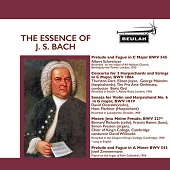 How do you distil The Essence of J S BACH onto one
programme? I’d want something orchestral – a Brandenburg Concerto or a
Suite – something choral from the Passions or the church cantatas – and
some organ music. It might not be my ideal mix, but 1PS97
does pretty well, with the Prelude and Fugue in C, BWV545,
from Albert Schweitzer (1935), Thurston Dart, the Pro Arte Orchestra and a distinguished
team of soloists in the Concerto for three harpsichords,
BWV1064 (1956), David Oistrakh and Hans Pischner in the Sonata for violin and keyboard No.6, BWV1019 (1960), the Motet Jesu meine Freude, BWV227, sung in English
by King’s College Choir under David Willcocks in 1959 and the Prelude and Fugue in a minor, BWV543 played in Cologne
Cathedral by Josef Zimmermann in 1956.
How do you distil The Essence of J S BACH onto one
programme? I’d want something orchestral – a Brandenburg Concerto or a
Suite – something choral from the Passions or the church cantatas – and
some organ music. It might not be my ideal mix, but 1PS97
does pretty well, with the Prelude and Fugue in C, BWV545,
from Albert Schweitzer (1935), Thurston Dart, the Pro Arte Orchestra and a distinguished
team of soloists in the Concerto for three harpsichords,
BWV1064 (1956), David Oistrakh and Hans Pischner in the Sonata for violin and keyboard No.6, BWV1019 (1960), the Motet Jesu meine Freude, BWV227, sung in English
by King’s College Choir under David Willcocks in 1959 and the Prelude and Fugue in a minor, BWV543 played in Cologne
Cathedral by Josef Zimmermann in 1956.
With the exception of the stylish account of the concerto, these are very
much performances in the old Bach style – the motets, for instance, needs a
bit of a push, as by Masaaki Suzuki and the Japan Bach Collegium (BIS-1841:
Recording of the Month –
review)
– but (very) good examples of their kind. The opening Schweitzer
recording is a bit overpowering, but otherwise the transfers have been well
made.
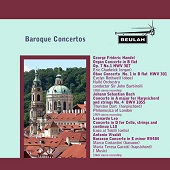 You may not think immediately of the Hallé Orchestra and Sir John Barbirolli as your first port of call for Baroque Concertos,
1PD71, but they provide the first two items on
a release with that title. Eric Chadwick was the soloist
in 1958 in George Frideric HANDEL Organ Concerto, Op.7/1
in B-flat, HWV307, and Evelyn Rothwell, alias Mrs
Barbirolli, plays the Oboe Concerto No.1 in B-flat,
HWV301.
You may not think immediately of the Hallé Orchestra and Sir John Barbirolli as your first port of call for Baroque Concertos,
1PD71, but they provide the first two items on
a release with that title. Eric Chadwick was the soloist
in 1958 in George Frideric HANDEL Organ Concerto, Op.7/1
in B-flat, HWV307, and Evelyn Rothwell, alias Mrs
Barbirolli, plays the Oboe Concerto No.1 in B-flat,
HWV301.
It’s interesting to compare the Organ Concerto with the recent set of the
Op.4 and Op.7 concertos on Alpha. Chadwick gives us the best of the old
school, not far from the half-way house to period performance that Simon
Preston and Yehudi Menuhin gave us, while Martin Haselböck divides critical
opinion. I liked the new Alpha better than Marc Rochester –
review
– but I appreciate that he could easily seem too idiosyncratic, and I agree
with MR in preferring Paul Nicholson’s budget-priced twofer on Hyperion –
review.
The Beulah release may well lead you that recording, except that the
Hyperion omits
the charming ‘Cuckoo and Nightingale’ concerto, included on the Alpha and
recorded by Simon Preston on the complete Trevor Pinnock Handel (DG
4791932, 11 CDs) or on a single CD of four Handel Organ Concertos (DG
4196342, recently reissued as a Presto special CD). The charming Rothwell
recording of the Oboe Concerto is something of a classic in its own right.
Thurston Dart
is again on hand as harpsichord soloist in Johann Sebastian BACH Keyboard Concerto No.4 in A,
BWV1055, with the Philomusica of London from 1959, and the
album is rounded off with a rarity, Leonardo LEO Cello Concerto in D, with Enzo Altobelli as soloist, and Antonio VIVALDI Bassoon Concerto in e minor, RV484, with I Musici, directed by Maria Teresa Garatti (harpsichord, 1960). Like the
Philomusica, I Musici were a transitional group from the older style of
performing baroque music. These two recordings were worth rescuing, but
most of their output now sounds more dated than that of Dart, whose stylish
recording of the Bach makes me wish that we had been given more from
SOL60007, whence BWV1055 is derived. Altobelli’s name is somewhat mangled
on the cover; otherwise, this selection of baroque concertos is well worth
having.
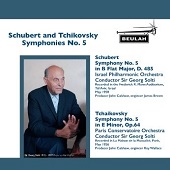 2PS98: Franz SCHUBERT Symphony No.5
from Sir Georg Solti with the Israel Philharmonic Orchestra in May 1958 – surely not the
right conductor for this music, with his reputation for driving hard? As it
happens, I was impressed from the word go – it’s light and airy rather than
hard driven, and the tempi right from the start pretty well ideal by
comparison with another recording from around the same time from a
conductor whom one would have expected to have had more rapport with
Schubert, Bruno Walter. Walter’s tempo for this movement is almost funereal
by comparison (Sony download G010004074220S, with Symphonies 8 and 9). Nor
does Solti allow the second movement to drag – it may be andante,
but it’s also con moto and Solti observes both aspects. Nor did
the remaining two movements diminish my genuine, if unexpected, enthusiasm
for this bright and shining recording.
2PS98: Franz SCHUBERT Symphony No.5
from Sir Georg Solti with the Israel Philharmonic Orchestra in May 1958 – surely not the
right conductor for this music, with his reputation for driving hard? As it
happens, I was impressed from the word go – it’s light and airy rather than
hard driven, and the tempi right from the start pretty well ideal by
comparison with another recording from around the same time from a
conductor whom one would have expected to have had more rapport with
Schubert, Bruno Walter. Walter’s tempo for this movement is almost funereal
by comparison (Sony download G010004074220S, with Symphonies 8 and 9). Nor
does Solti allow the second movement to drag – it may be andante,
but it’s also con moto and Solti observes both aspects. Nor did
the remaining two movements diminish my genuine, if unexpected, enthusiasm
for this bright and shining recording.
With the coupling of Pyotr Il’yich TCHAIKOVSKY Symphony No.5 with the Paris Conservatoire Orchestra (May 1956), we are on much
more mainstream Solti territory and there’s plenty of the expected energy
in this recording, especially in the opening movement, taken a good deal
faster even than by Szell, renowned as a speed merchant (Sony 82876787442,
with Capriccio Italien, download only). But it’s not over-driven;
there’s plenty of warmth, too. If you want to hear how hard the symphony
can be pushed, there’s still no finer way to do so than from the DG
Mravinsky recordings of Nos. 4 to 6 (Originals 4775911).
Both these recordings are available on Eloquence twofers, but the Beulah
coupling is more economical. Both recordings were overseen by the legendary
John Culshaw and have come up sounding well, especially if you choose to
stream or download in lossless sound from Qobuz. 2PS98
[68:24]

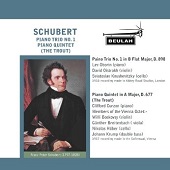 There’s more SCHUBERT on another Beulah release: the Piano Trio No.1 in B-flat, D898, and the ‘Trout’ Quintet in A, D677 on 2PS21
[71:21] Lev Oborin, David Oistrakh and Sviatoslav Knushevitzky recorded the Trio at Abbey Road in
1958, while Clifford Curzon and the Vienna Octet gave the classic performance of the
Quintet in the Sofiensaal Vienna in October 1957. The Warner Classics
reissue of the Trio comes as a download without coupling; on CD it’s part
of a multi-disc set, so the Beulah offers especially good value. The
transfer is good, if a little shrill at times.
There’s more SCHUBERT on another Beulah release: the Piano Trio No.1 in B-flat, D898, and the ‘Trout’ Quintet in A, D677 on 2PS21
[71:21] Lev Oborin, David Oistrakh and Sviatoslav Knushevitzky recorded the Trio at Abbey Road in
1958, while Clifford Curzon and the Vienna Octet gave the classic performance of the
Quintet in the Sofiensaal Vienna in October 1957. The Warner Classics
reissue of the Trio comes as a download without coupling; on CD it’s part
of a multi-disc set, so the Beulah offers especially good value. The
transfer is good, if a little shrill at times.
There are several download versions of the ‘Trout’ Quintet, at least one
offering no coupling at all, while the Beulah coupling is one of the most
generous and interesting. The Decca reissue, download only, comes with the
‘Death and the Maiden’ quartet; the least expensive lossless version that I
could find costs almost £10, so the Beulah, at £7.99, is very good value.
Whichever version you choose, this remains my benchmark for the work, while
the recording has been well transferred, with just one tiny blip in the
finale. Just sample the fourth movement, the variations on the theme of the
song and this recording will be a must.

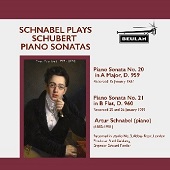 1PS93: Franz SCHUBERT
1PS93: Franz SCHUBERT
Piano Sonatas: No. 20 in A, D959; No. 21 in B-flat, D960
Artur Schnabel (piano)
rec. Studio 3, Abbey Road, London, 15 January 1937 and 25-26 January 1939.
[70:34]
Mention Schnabel today, and I, for one, immediately think of his Beethoven,
not least of an unfortunate accident with a set of his 78s on the escalator
at Piccadilly Circus tube station – there wasn’t much left of the fragile
shellacs by the time they reached the bottom. In November 1937, however, we
find the Gramophone reviewer writing “I like Schnabel’s playing of the
Schubert piano sonatas better than anything else he does. Much better,
certainly, than his Beethoven.” To obtain D959 then on five 12” records
would have cost 27/-, a small fortune, at least £60 in today’s values, so
we can be grateful that Beulah offer both the final sonatas for £7.99.
It seems to have come as a surprise to that reviewer that the music could
be so beautiful; it’s easy to take for granted the ready availability of
some first-rate recordings of these works and at such reasonable prices. To
take just one example, Brendel’s 1970s recordings of D958, 959 and 960,
with Three Piano Pieces, D946, cost just less than £10 on CD or as a
lossless download (Decca 4387032). If Brendel’s or Schnabel’s Schubert is not to your
liking, there’s plenty else to choose, not least, for me, Clifford Curzon,
recorded at The Maltings in 1972 (Decca 4176422, Presto CDR, or Clifford
Curzon: Complete Decca Recordings, 4784389, 25 hours, download only, around
£40 in lossless sound).
You won’t expect the Schnabel recordings from 78s to sound anything like as
good as Brendel or Curzon, but you may find yourself thinking again: the sound is inevitably
rather dry, but perfectly tolerable – after a while, it’s not difficult to
forget that these performances were set down so long ago. It’s also easy to
forget that it was all or nothing then, with no prospect of splicing in
remakes; once the machine had stopped cutting one disc, it was straight on
to another.
Comparing Schnabel with Serkin in a review of the latter’s D959, Jonathan
Woolf expressed the contrast perfectly: Schnabel’s Schubert is “the way of
the splintered flesh, the all too bodily.” He also mentions Curzon’s
“fallible absorption” in the Impromptus which form the coupling on the
Serkin recording –
review.
I couldn’t express my own love of Curzon’s D960 any better, or my very
pleasant surprise in discovering these Schnabel recordings to be equally
treasurable. If anything, D960 is even better than its predecessor, but the
recording is a little more clangourous. No matter – I may have found an
alternative to Curzon’s D960 for my funeral.
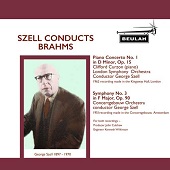 Szell conducts BRAHMS
(1PS95)
contains the classic 1962 recording of Piano Concerto No.1
with Clifford Curzon, the London Symphony Orchestra and George Szell, plus Szell with the Concertgebouw Orchestra in Symphony No.3
in 1951. This is well worth having for the piano concerto alone – the
alternative Decca reissue is also now download only, and, though costing
more than when it was on CD, less expensive than the Beulah (4663762). The
playing time of 81:47 has led to Qobuz charging £11.99 for the Beulah – a
very thin excuse for exceeding their usual £7.99. That and the different
couplings – Franck Symphonic Variations and the Litolff Scherzo on Decca –
should decide the issue for you. Unless you want one of the recordings with
a piano contemporary with the concerto itself, Curzon and Szell will still
do fine, the recording well transferred on Beulah. If it has to be the
contemporary piano, it’s between Schiff in both concertos: Recommended –
review
– and Melnikov/Bolton in No.1 –
review.
Szell conducts BRAHMS
(1PS95)
contains the classic 1962 recording of Piano Concerto No.1
with Clifford Curzon, the London Symphony Orchestra and George Szell, plus Szell with the Concertgebouw Orchestra in Symphony No.3
in 1951. This is well worth having for the piano concerto alone – the
alternative Decca reissue is also now download only, and, though costing
more than when it was on CD, less expensive than the Beulah (4663762). The
playing time of 81:47 has led to Qobuz charging £11.99 for the Beulah – a
very thin excuse for exceeding their usual £7.99. That and the different
couplings – Franck Symphonic Variations and the Litolff Scherzo on Decca –
should decide the issue for you. Unless you want one of the recordings with
a piano contemporary with the concerto itself, Curzon and Szell will still
do fine, the recording well transferred on Beulah. If it has to be the
contemporary piano, it’s between Schiff in both concertos: Recommended –
review
– and Melnikov/Bolton in No.1 –
review.
Szell went on to record the Brahms Third in stereo with his own Cleveland
Orchestra, but his many fans will enjoy this rather hard-driven account of
the work; my own favourite among such interpretations remains with
Klemperer’s later recording, slower all round but sometimes, aptly,
described as ‘granite-hewn’ (Warner 4043382, 4 CDs, budget-price). The
Klemperer recording is not ideal, but it’s preferable to the Szell, which
sounds really grainy immediately after the recording of the piano concerto.
The Szell Third entered the then infant LP catalogue alongside Eduard van
Beinum’s First, also with the Concertgebouw. That fine account has already
been released by Beulah on Van Beinum conducts Brahms with
his 1958 recording of the Violin Concerto with Arthur Grumiaux. In
February 2017
I wrote that Beinum couldn’t put a foot wrong in Brahms and that it would
be hard to name a more affectionate recording of the big tune in the
finale.
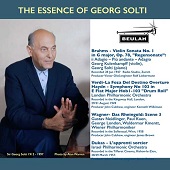 More Solti on The Essence of George Solti
(1PS98). It was
inevitable that an album with that title would include an excerpt from his
ground-breaking Decca recording of Richard WAGNER Ring
cycle, represented here by Scene 3 of Das Rheingold, recorded in the Sofiensaal,
Vienna, under the direction of John Cushaw in 1958. The recording concept
for the cycle has been described too often to need repeating; suffice to
say that it still sounds first-rate and that the transfer is very good.
It’s just a great pity that Decca withdrew their blu-ray release of the
whole Solti cycle on one disc inside a hard-back book; I hope that their recent
blu-ray + 5-CD Karajan Sibelius lasts longer: Recording of the Month –
review.
More Solti on The Essence of George Solti
(1PS98). It was
inevitable that an album with that title would include an excerpt from his
ground-breaking Decca recording of Richard WAGNER Ring
cycle, represented here by Scene 3 of Das Rheingold, recorded in the Sofiensaal,
Vienna, under the direction of John Cushaw in 1958. The recording concept
for the cycle has been described too often to need repeating; suffice to
say that it still sounds first-rate and that the transfer is very good.
It’s just a great pity that Decca withdrew their blu-ray release of the
whole Solti cycle on one disc inside a hard-back book; I hope that their recent
blu-ray + 5-CD Karajan Sibelius lasts longer: Recording of the Month –
review.
The VERDI, too, La Forza del Destino
Overturee, and the DUKAS L'Apprenti Sorcier are
mainland Solti territory; the latter, recorded with the Israel Philharmonic
in 1957, has been the coupling on several Decca releases over the years,
currently on a 2-CD Eloquence set Solti at the Ballet, but it's
equally at home on this Beulah, while the BRAHMS Violin
Sonata No.1, with Georg Kulenkampff, is a reminder that one wishes he had
recorded more chamber repertoire.
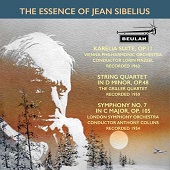
Mention of SIBELIUS leads inevitably to The Essence of Jean Sibelius on 1PS96
[70:07] My only reservation is that the inclusion of Symphony No.7 from the celebrated cycle which Anthony Collins recorded with the LSO in
mono for Decca (1954) might prevent potential purchasers from going for the
complete set on two Eloquence twofers. (Also included in the recent 14-CD
set, Eloquence 4841467.)
The Karelia Suite, recorded by Lorin Maazel with the VPO in 1963, which
opens the programme, was released at the same time as a very worthwhile
cycle of Sibelius symphonies made by that team; like them it still sounds
well in this transfer (Decca 4307782, download only, budget price), and the Griller Quartet in the String Quartet
(1950) remind us what a fine ensemble they were, ‘thoughtful and intense’
in Sibelius, as Lionel Salter wrote in June 1951.
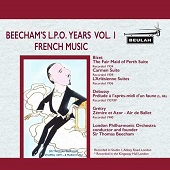 If there’s one thing that Sir Thomas Beecham did
even better
than British Music, it’s to be found in his recordings of French Music. On Volume 1 of his LPO Years, 15PDR4 [73:01] Beulah have
reissued his recordings of Georges BIZET – Suites from The Fair Maid of Perth (1934) Carmen (1939) and L’Arlésienne (1936) Claude DEBUSSY – Prélude a l’après midi d’un faune (1937/8) and André GRÉTRY – the Air de Ballet
from Zémir et Azore (1940). These supplement the
earlier release of his later recordings of ‘lollipops’ in 2020 (14PDR4 –
Beulah Late 2020). Older recordings these may be, but they have come up amazingly well in
the Beulah transfer with the Beecham magic intact.
If there’s one thing that Sir Thomas Beecham did
even better
than British Music, it’s to be found in his recordings of French Music. On Volume 1 of his LPO Years, 15PDR4 [73:01] Beulah have
reissued his recordings of Georges BIZET – Suites from The Fair Maid of Perth (1934) Carmen (1939) and L’Arlésienne (1936) Claude DEBUSSY – Prélude a l’après midi d’un faune (1937/8) and André GRÉTRY – the Air de Ballet
from Zémir et Azore (1940). These supplement the
earlier release of his later recordings of ‘lollipops’ in 2020 (14PDR4 –
Beulah Late 2020). Older recordings these may be, but they have come up amazingly well in
the Beulah transfer with the Beecham magic intact.
There’s another area in which Beecham excelled in addition to British and
French music, and that’s the music of Sibelius. Beulah have already given
us Beecham conducts Sibelius (2PDR4 –
DL News 2015/10)
and Somm’s recent release of his previously unissued live recording of
the First Symphony with the RPO from the Usher Hall in 1952, with some of
the Scènes historiques, from the same sessions as those on Beulah
(Somm Ariadne 1503 – my review pending), reminds me that Somm already had a
very worthwhile reissue of his early 1950s Fourth and Sixth –
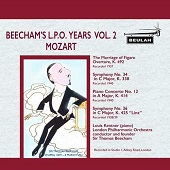 review
–
review.
review
–
review.
Two other recordings of Beecham’s LPO Years bring MOZART (Volume 2, 16PDR4) and Opera and Oratorio (Volume 3, 17PDR4).
The MOZART opens with the Marriage of Figaro Overture (1937), followed bySymphony No.34 (1940), Piano Concerto No.12 (with Louis Kentner,
1940) and Symphony No.36, ‘Linz’ (1938/9). This recording
of Symphony No.34 has already appeared on 1PDR4, which I
reviewed
in 2015 – some gremlin got into the works and cut the title Jupiter from Symphony No.41 earlier in that heading and bestowed
on this less magisterial, less often performed, but still enjoyable
symphony. The sound is inevitably on the dry side, but Beecham gives it and
everything else lots of affection.
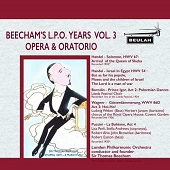 The Opera and Oratorio selection brings excerpts from HANDEL, the Arrival of the Queen of Sheba, from Solomon (1933), three items from Israel in Egypt, the Polovtsian Dances from BORODIN Prince Igor (all Leeds Festival, 1934) an
excerpt from WAGNER Götterdämmerung (live, Covent
Garden, 1936) and Act 4 of PUCCINI La Bohème.
The Opera and Oratorio selection brings excerpts from HANDEL, the Arrival of the Queen of Sheba, from Solomon (1933), three items from Israel in Egypt, the Polovtsian Dances from BORODIN Prince Igor (all Leeds Festival, 1934) an
excerpt from WAGNER Götterdämmerung (live, Covent
Garden, 1936) and Act 4 of PUCCINI La Bohème.
The Handel inevitably sounds rather heavy now – Beecham was apt to throw in
everything he had; his Messiah, mercifully not included here, was
really OTT, but it’s the Puccini that really interested me. Beecham’s later
recording of La Bohème is my benchmark, with
Victoria de los Angeles and Jussi Björling (Warner 5677502, download only,
no booklet, or Naxos Historical 8111249-50), but I hadn’t heard this
earlier (1935) version with Lisa Perll, Stella Andrews, Robert Alva, John
Brownlee and Robert Easton. At 27 minutes, it’s the longest item on the
programme, and I enjoyed hearing it, the rather dry sound no real handicap.
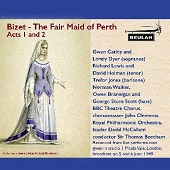 In the same month as the LPO Beecham, Beulah released another recording of
his way with French music, Georges BIZET The Fair Maid of Perth – the rarely
performed complete work, not just the orchestral suite in a broadcast
recording from June 1949, on 1PD23 and 2PD23. A strong cast, including some of the best-known
singers of the time with the BBC Theatre Chorus are
accompanied by the RPO, conducted by Sir Thomas Beecham.
In the same month as the LPO Beecham, Beulah released another recording of
his way with French music, Georges BIZET The Fair Maid of Perth – the rarely
performed complete work, not just the orchestral suite in a broadcast
recording from June 1949, on 1PD23 and 2PD23. A strong cast, including some of the best-known
singers of the time with the BBC Theatre Chorus are
accompanied by the RPO, conducted by Sir Thomas Beecham.
This recording had already been resurrected by Beulah on CD and had been
favourably reviewed on MusicWeb by
John Quinn
and
Robert McKechnie. I’ll merely add that the recording has been further tidied up, though it
still requires some tolerance, especially in places. It may not be the
greatest Bizet, but it’s well worth hearing this vintage realisation.
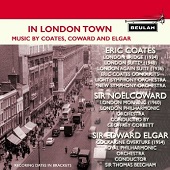 In London Town
brings together two masters of light classical music, Eric COATES and Noël COWARD, with Sir Edward ELGAR.
In London Town
brings together two masters of light classical music, Eric COATES and Noël COWARD, with Sir Edward ELGAR.
Coates conducts his own music with the Light Symphony Orchestra and the New
Symphony Orchestra: London Bridge (rec. 1934), London Suite (1948) and London Again Suite (1936). These selections from the many
recordings which Coates made include his two best-known works, the two
London suites, the first including the Knightsbridge March which older
listeners will recall as the theme tune of the Saturday evening radio
programme In Town Tonight. If you wish to explore this now rather neglected
composer some more, look no further than an inexpensive 2-CD Classics for
Pleasure with performances directed by Sir Charles Groves, Sir Charles
Mackerras and Reginal Kilbey (3523562). The earliest of these Beulah recordings
cannot compare with the more recent CfP, but the transfers have been well
made and the ear soon adjusts, especially to the 1948 London Suite.
Coward’s London Morning was recorded by the LPO and
Geofrey Corbett in July 1959. There are transfers of this piece on Naxos
Classical Archives (no coupling) and Eloquence (a 2-CD set with Coates
conducting his own music and Sir Malcolm Sargent’s Enigma Variations).
Elgar’s Cockaigne Overture rounds off the programme in a
stylish performance from the RPO and Sir Thomas Beecham (1954). Beecham’s
mono recordings, once available from Sony, have largely disappeared from
the catalogue in any format, so this reminder is very apt. 2PD77 [74:05]
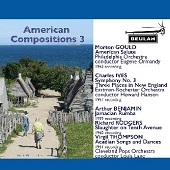 4PDR1: American Compositions 3
4PDR1: American Compositions 3
Morton GOULD
American Parade
Philadelphia Orchestra/Eugene Ormandy – rec. 1962.
Charles IVES
Symphony No.3; Three Places in New England
Eastman-Rochester Orchestra/Howard Hanson – rec. 1957
Arthur BENJAMIN
Jamaican Rumba
Richard RODGERS Slaughter on Tenth Avenue
Virgil THOMPSON
Arcadian Songs and Dances
Cleveland Pops Orchestra/Louis Lane – rec. 1959-1961 [63:38]
The programme opens in stirring fashion, with Morton Gould’s arrangement of
‘When Johnny comes marching home’; you might have thought that a little
frivolous for Eugene Ormandy, but he and the Philadelphia Orchestra throw
themselves into it, and the 1962 recording sounds almost fresh-minted in
this transfer.
After that, it’s quite a change to the two works by Charles Ives. Hanson’s
Mercury recordings of these remain available on 4327552 (Presto special
CDR, with William Schuman and Mennin) or as a download-only set of American
Masterworks, once available on five CDs, 4756274. Reviewing this same
recording of the Ives Symphony from a hi-res tape transfer in
January 2011,
I thought it a very competitive version, with the transfer, heard in
24/96 sound, excellent. My comments on the performance remain valid, while
the Beulah transfer in ‘mere’ 16-bit sound is very good indeed. In the same
review, Dan Morgan was also impressed by hearing “a genuine classic
restored”. See also Rob Barnett’s
review
of the Ives. Ten years on, would he still consider Dan and myself a
‘doughty’ team?
I could have wished the three items from the Cleveland Pops orchestra to
have preceded the Ives – Jamaican Rumba comes over as a bit trite
after ‘The Housatonic at Stockbridge’, but that’s my only reservation about
this recording. If the Schnabel Schubert (below) had not swept the board,
this could easily have been my choice of Beulah's April 2021 releases for the
‘Recommended’ label.
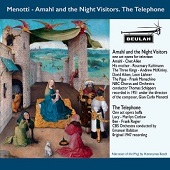 Gian Carlo MENOTTI Amahl and the Night Visitors
has not had too many outings on record recently. A Christmas-themed
one-act opera for television, I’m old enough to remember when it was
broadcast by the BBC in 1955. The Beulah reissue is of the 1951 recording
made by the NBC Symphony Chorus and Orchestra with Thomas Schippers, under
the guidance of the composer. It’s coupled on 1PDR41 with
another one-act opera The Telephone, recorded by
soloists, CBS Orchestra and Emanuel Baliban in 1947.
Gian Carlo MENOTTI Amahl and the Night Visitors
has not had too many outings on record recently. A Christmas-themed
one-act opera for television, I’m old enough to remember when it was
broadcast by the BBC in 1955. The Beulah reissue is of the 1951 recording
made by the NBC Symphony Chorus and Orchestra with Thomas Schippers, under
the guidance of the composer. It’s coupled on 1PDR41 with
another one-act opera The Telephone, recorded by
soloists, CBS Orchestra and Emanuel Baliban in 1947.
There’s a modern Naxos CD which Dan Morgan thought ‘a real cracker’ –
review
– and Simon Thompson thought ‘a strong performance’ –
review
– but the Beulah recaptures a memory which many will treasure, though I
regret that I was decidedly under-impressed at the time, watching it on a
grainy 12” black-and-white television.
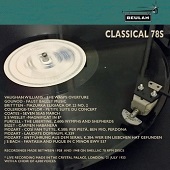 Classical 78s
on 3PD4 [73:42] takes us further back than most of these
Beulah reissues, with recordings dating from 1924, when acoustic horns were
employed before the development of the microphone, until 1948.
Transferring early LPs needs to be done with skill and care, but 78s are a
whole order more difficult in reducing the shellac surface noise without
compromising the dynamic range of the recording. Once again, it’s Beulah
and Naxos Historical that I think of in that regard. I came to this Beulah
reissue fresh from amazement at the quality of the Naxos transfers of
Kajanus’ early 1930s recordings of the earlier symphonies of his friend
Sibelius, so the bar was set pretty high, and I was not disappointed.
Classical 78s
on 3PD4 [73:42] takes us further back than most of these
Beulah reissues, with recordings dating from 1924, when acoustic horns were
employed before the development of the microphone, until 1948.
Transferring early LPs needs to be done with skill and care, but 78s are a
whole order more difficult in reducing the shellac surface noise without
compromising the dynamic range of the recording. Once again, it’s Beulah
and Naxos Historical that I think of in that regard. I came to this Beulah
reissue fresh from amazement at the quality of the Naxos transfers of
Kajanus’ early 1930s recordings of the earlier symphonies of his friend
Sibelius, so the bar was set pretty high, and I was not disappointed.
The very fine opening transfer of a recording of Ralph VAUGHAN
WILLIAMS’ The Wasps Overture, from
the Queen’s Hall Orchestra and Sir Henry Wood and the following Charles GOUNOD Ballet Music from Faust (National
Symphony Orchestra/Anatole Fistoulari) set the tone for the rest of this
very interesting back trip to the past. It may be a foreign country, where
they do things differently, as the opening of The Go Between reminds us,
but it’s an interesting place to visit in transfers of this quality.
From 2020, one release that I seem to have missed:
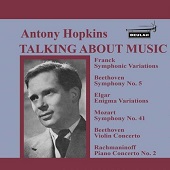 12PD50: Antony Hopkins
– Talking about Music: FRANCK Symphonic Variations,
BEETHOVEN Symphony No.5, ELGAR ‘Enigma’
Variations, MOZART Symphony No.41 ‘Jupiter’,
BEETHOVEN Violin Concerto and RACHMANINOV
Piano Concerto No.2. [87:20]
12PD50: Antony Hopkins
– Talking about Music: FRANCK Symphonic Variations,
BEETHOVEN Symphony No.5, ELGAR ‘Enigma’
Variations, MOZART Symphony No.41 ‘Jupiter’,
BEETHOVEN Violin Concerto and RACHMANINOV
Piano Concerto No.2. [87:20]
Much of what many of us oldies know about music was gleaned from listening
to Antony Hopkins and his 15-minute radio talks. For those who remember
them, this is a very worthwhile revisitation; those who have not heard them
stand to learn a great deal. One quibble: because the time limit is just
over the 80-minute mark, Qobuz charge as if for a double album.
See also Len Mullenger’s
obituary article.
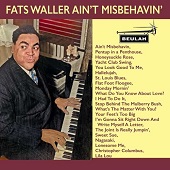 1PS85: Fats Waller – Ain’t Misehavin.
Beulah don’t give us the recording dates for the items on this programme
which, in addition the title track, also includes
Honeysuckle Rose, St Louis Blues, I’m gonna sit right down and write
myself a letter, Sweet Sue,
and Lonesome me. As Fats Waller died in 1943 and he began
recording in the late 1920s, these are, of course, vintage 78 rpm
recordings, but still relevant today.
1PS85: Fats Waller – Ain’t Misehavin.
Beulah don’t give us the recording dates for the items on this programme
which, in addition the title track, also includes
Honeysuckle Rose, St Louis Blues, I’m gonna sit right down and write
myself a letter, Sweet Sue,
and Lonesome me. As Fats Waller died in 1943 and he began
recording in the late 1920s, these are, of course, vintage 78 rpm
recordings, but still relevant today.
Almost 80 years on, his name is still
well enough known even by those born long after that date, usually in
association with that title track. The
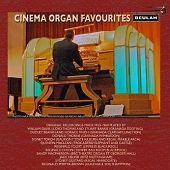 ‘buddies’ with whom he performed
included such luminaries as Jack Teagarden, and other well-known performers
made their own recordings of his compositions.
‘buddies’ with whom he performed
included such luminaries as Jack Teagarden, and other well-known performers
made their own recordings of his compositions.
3PD7: Cinema Organ Favourites.
We have already had a Beulah album of Reginald Dixon at the organ of the
Blackpool Tower Ballroom; now here he is again, as part of an album with
some of the other great exponents of the cinema organ, recorded from 1935
to 1960. Dixon himself and Sidney Torch apart, the latter here on the
organs of the Gaumont, Kilburn, and the Regal, Marble Arch, most of the
names will be known only to the aficionados of the genre. Most of the
organs have gone, but there are, I believe, still plenty of those
aficionados about, not just among the older generation.
***
One of the specialities of Beulah is the reissue in good transfers of jazz
music. I’m listing the recent releases below with minimal comment in order
to get this round-up completed without even more delay. Readers attracted
to any of these will not need too much comment from me – each one is
self-recommending to the right audience.
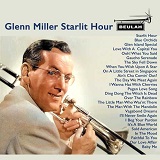 Glenn Miller Starlit Hour
(6PS39)
Glenn Miller Starlit Hour
(6PS39)
Includes: Starlit Hour; Blue Orchids; Glen Island special; Gaucho serenade;
The sky fell down; When you wish upon a star; Pagan love song; Ding dong,
the witch is dead; Over the rainbow; In the mood; Faithful to you; Our love
affair; Baby me.
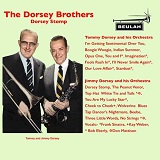
The Dorsey Brothers: Dorsey Stomp
(1PS99)
Tommy Dorsey and his Orchestra:
Includes: I’m getting sentimental over you; Boogie woogie; Indian Summer;
and, with Frank Sinatra:
You and I; Imagination; Fools rush in; Our
love affair; Stardust
Jimmy Dorsey and his Orchestra:
Includes: Dorsey Stomp; The peanut vendor; Top hat, white tie and tails;
Cheek to cheek; Three little words; No strings
Six volumes of a new Beulah series, Jazz Britannica, have
been released:
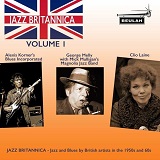
Volume 1 (1PS94) is something of a calling card for the
series featuring music from the 1950s and 60s, with contributions by Alexis Korner, George Melly and Cleo Laine:
Includes: Spooky but nice; Hoochie Coochie; Mamma don’t allow it; Rocking
chair; There’ll be some changes made; Alexander’s Ragtime Band; Sweet
Lorraine; After you’ve gone away; Old Devil Moon and I’m gonna sit right
down and write myself a letter, etc.
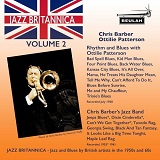
Volume 2 (2PS94): Rhythm and Blues with Ottilie Patterson:
Includes: Bad spell blues; Kid man blues; Four point blues; Back water
blues; Kansas City blues; It’s all over; Can’t afford to do it, etc. – rec.
July 1960
Chris Barber’s Jazz Band:
Includes: Jeep's blues; Dixie Cinderella; Tuxedo rag; Maple leaf rag, etc. –
rec. 1955, 1961
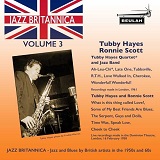
Volume 3 (3PS94): Tubby Hayes’ Quartet and Jazz Band;
Includes: Ah-Leu-Chi; Late One; Tubbsville; Love walked in; Cherokee, etc.
– rec. London, 1961
Tubby Hayes and Ronnie Scott
:
Includes: What is this thing called Love? Some of my best friends are blues;
Guys and dolls; Time was; Cheek to cheek, etc. – rec. live Dominion
Theatre, 16 February 1958.
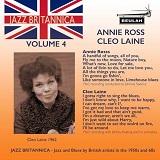
Volume 4 (4PS94): Annie Ross:
Including: A handful of songs, All of you; Fly me to the moon; Love for
sale; All the things you are; Limehouse blues, etc. – conducted by Johnny
Spence – rec. 1962
Cleo Laine
:
Including: I gotta right to sing the blues; I’ve got my love to keep me
warm; I’m just wild about Harry; I’ll be around, etc. – with Johnny Keating
and his orchestra – rec. 1962
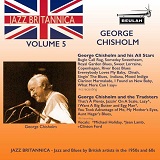
Volume 5 (5PS94): George Chisholm and his All Stars:
Including: Bugle call rag; Sweet Lorraine; Everybody loves my baby; Dinah;
Singin’ the blues; Mood indigo; I found a new baby, etc. – rec. 1962
George Chisholm and his Tradsters
:
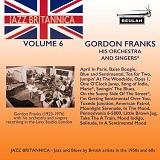
Including: That’s a plenty; Jazzin’ on a scale; Lazy; You took advantage of
me; My mother’s eyes; Aunt Hagar’s blues, etc. – rec. 1961
Volume 6 (6PS94): George Franks, his Orchestra and Singers
Includes: April in Paris; Tea for two; On the sunny side of the street; I’m
getting sentimental over you; Tuxedo junction; American patrol; Moonlight
serenade; In the mood; Little brown jug; Take the A train; Mood indigo;
Solitude; In a sentimental mood, etc.



 All Nimbus reviews
All Nimbus reviews








